|
|
|
Sort Order |
|
|
|
Items / Page
|
|
|
|
|
|
|
| Srl | Item |
| 1 |
ID:
164379


|
|
|
| 2 |
ID:
110175
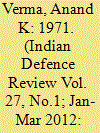

|
|
|
| 3 |
ID:
129735
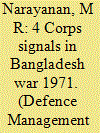

|
|
|
| 4 |
ID:
131909
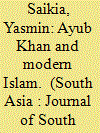

|
|
|
|
|
| Publication |
2014.
|
| Summary/Abstract |
Pakistan is viewed today as a haven for fundamentalist Islamists. This essay probes the genealogy of Pakistan's Islamisation by focusing on the rule of President Ayub Khan (1958-69) and extends to the war of 1971 and the dismembering of Pakistan during Yahya Khan's presidency. I trace Ayub Khan's project of 'modernising Islam and the nation' by probing three sites: the transformation of the Pakistani military into a jihadic army; the re-writing of history to craft an Islamic identity; and the reformation of East Pakistani Bengalis to make them 'good Muslim subjects'. Ayub Khan's experiment was a failure, leading to the violent dismembering of the country in 1971, yet an ethical imaginaire of renewing the commitment to creating a humanistic moral community continues to be an ongoing quest in Pakistan, as reflected in my investigations of the oral testimonies of war veterans. Fulfilling these ethical concerns requires critical evaluation of the roots of Islamisation in Pakistan, beginning from the period of Ayub Khan's presidency.
|
|
|
|
|
|
|
|
|
|
|
|
|
|
|
|
| 5 |
ID:
041324


|
|
|
|
|
| Edition |
rev. 2nd ed.
|
| Publication |
Dacca, Begum Dilafroz Quaderi, 1972.
|
| Description |
xv, 455p.hbk
|
|
|
|
|
|
|
|
|
|
|
|
Copies: C:1/I:0,R:0,Q:0
Circulation
| Accession# | Call# | Current Location | Status | Policy | Location |
| 011637 | 954.9204/QUA 011637 | Main | On Shelf | General | |
|
|
|
|
| 6 |
ID:
085162
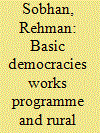

|
|
|
|
|
| Publication |
Lahore, Oxford University Press, 1968.
|
| Description |
viii,328p.
|
|
|
|
|
|
|
|
|
|
|
|
Copies: C:1/I:0,R:0,Q:0
Circulation
| Accession# | Call# | Current Location | Status | Policy | Location |
| 003886 | 320.954 910 4/SOB 003886 | Main | On Shelf | General | |
|
|
|
|
| 7 |
ID:
183177
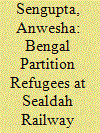

|
|
|
|
|
| Summary/Abstract |
This article focuses on the Sealdah railway station in Calcutta, West Bengal, as a site of refugee ‘settlement’ in the aftermath of British India’s partition. From 1946 to the late 1960s, the platforms of Sealdah remained crowded with Bengali Hindu refugees from East Pakistan. Some refugees stayed a few days, but many stayed for months, even years. Relying on newspaper reports, autobiographical accounts and official archives, this article elaborates how a busy railway station uniquely shaped the experiences of partition refugees. Despite severe infrastructural limitations, the railway platforms of Sealdah provided these refugee residents with certain opportunities. Many preferred to stay at Sealdah instead of moving to any government facility. However, even for the most long-term residents of Sealdah, it remained a temporary home, from where they were either shifted to government camps or themselves found accommodation in and around Calcutta. The article argues that by allowing the refugees to squat on a busy railway platform for months and years, the state recognised a unique right of these refugees, their right to wait, involving at least some agency in the process of resettling.
|
|
|
|
|
|
|
|
|
|
|
|
|
|
|
|
| 8 |
ID:
191942
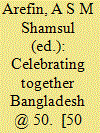

|
|
|
|
|
| Publication |
Dhaka, Friends of Bangladesh, 2021.
|
| Description |
xxvii, 416p.hbk
|
| Standard Number |
9789843507204
|
|
|
|
|
|
|
|
|
|
|
|
Copies: C:1/I:0,R:0,Q:0
Circulation
| Accession# | Call# | Current Location | Status | Policy | Location |
| 060432 | 954.92051/ARE 060432 | Main | On Shelf | General | |
|
|
|
|
| 9 |
ID:
105982
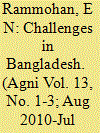

|
|
|
| 10 |
ID:
075610
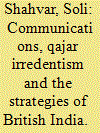

|
|
|
|
|
| Publication |
2006.
|
| Summary/Abstract |
Persian territorial designs in Baluchistan clashed with British interest to construct an Indo-European telegraph line through the Makran Coast, where Britain had close local allies in dispute with Persia. The British prime interest being the speedy construction of the line, they decided on bypassing these disputed territories by connecting Bushehr, through submarine cable, with Gwadar-which they believed, contrary to the Persians, to be non-Persian. The Persian government protested against the British infringement of her sovereign rights, adopting both diplomatic and military approaches. This forced the British government to check the legality of the Persian claims. But the arbitrary was neither neutral nor fair, with Britain opposing the suzerainty of Persia over the chiefs of western Makran, while acknowledging the right of conquest by others elsewhere on the coast. This was in line with British policy of favoring governments bordering British India over Persia. Although unable to change the arbitrary, the Persian government still managed, in spite of her military weakness, to drag the British government into a hard bargain and tough negotiations.
|
|
|
|
|
|
|
|
|
|
|
|
|
|
|
|
| 11 |
ID:
128135
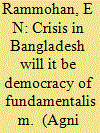

|
|
|
|
|
| Publication |
2013.
|
| Summary/Abstract |
Bangladesh was born in December 1971, after Pakistan rejected installation of the Awami League of East Pakistan, that had won the national elections held in end 1970 and then proceeded to crush democracy in East Pakistan by arresting the leaders of the Awami League and brutally suppressing its democratic movement. The Awami League and the people of East Pakistan were thus forced to resort to guerilla warfare and fight for independence. In this fight the Muslim population of East Pakistan got divided. Some Bengali Muslims who supported the fundamentalist right, sided with Pakistan in its attempt to crush the move for independence by the majority of Bengali Muslims.
|
|
|
|
|
|
|
|
|
|
|
|
|
|
|
|
| 12 |
ID:
179411
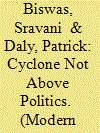

|
|
|
|
|
| Summary/Abstract |
On 12 November 1970, the Bhola Cyclone swept across the southern districts of East Pakistan, killing over 300,000 people. Small islands were swept away and dead bodies of humans and cattle lay strewn across the devastated landscape. Following the news of the destruction, journalists, students, artists, and political workers rushed to the affected area with basic relief supplies, without waiting for the Military Law Administration (MLA) to intervene. The cyclone's occurrence just three weeks prior to the first general elections in Pakistan added a new dimension to the already simmering political crisis. The extensive media coverage of the disaster brought the pitiful state of infrastructural development and lack of governance in East Pakistan under local and global scrutiny. The cyclone and the corresponding issues soon became embroiled within the larger political demand for regional autonomy. The MLA came under attack from sections of East Pakistan's politicians, press, and public, as well as international political actors, for its poor disaster governance. This article uses the Bhola Cyclone of 1970 as the lens to explore the complex interconnections between environmental disasters and a key issue of governance. While the Bhola Cyclone has been a subject of recent discussions, this article uses a disaster-politics analytical framework to understand the disaster's role in the subsequent political turbulence and the emergence of Bangladesh.
|
|
|
|
|
|
|
|
|
|
|
|
|
|
|
|
| 13 |
ID:
027061
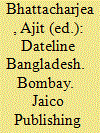

|
|
|
|
|
| Publication |
Bombay, Jaico Publishing house, 1971.
|
| Description |
252p.hbk
|
|
|
|
|
|
|
|
|
|
|
|
Copies: C:1/I:0,R:0,Q:0
Circulation
| Accession# | Call# | Current Location | Status | Policy | Location |
| 007905 | 954.9205/BHA 007905 | Main | On Shelf | General | |
|
|
|
|
| 14 |
ID:
187209
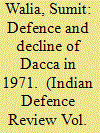

|
|
|
| 15 |
ID:
028022
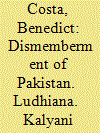

|
|
|
|
|
| Publication |
Ludhiana, Kalyani Publishers, 1972.
|
| Description |
165p.hbk
|
|
|
|
|
|
|
|
|
|
|
|
Copies: C:1/I:0,R:0,Q:0
Circulation
| Accession# | Call# | Current Location | Status | Policy | Location |
| 008876 | 954.9205/COS 008876 | Main | On Shelf | General | |
|
|
|
|
| 16 |
ID:
142003
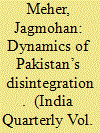

|
|
|
|
|
| Summary/Abstract |
This article attempts to answer two questions: (a) what led to the psychological fissure of the East Pakistanis? And (b) how did the psychological fissure culminate into their physical separation? To answer the first question, the study examines six variables of perpetual antagonism between East and West Pakistan, that is, geographical absurdity, constitutional confusions and military takeover, economic disparity, language issues, political factionalism and military dynamics, and establishes that the conjuncture of all these factors (rather than the role of India or outside actors which have often been exaggerated ignoring the internal dynamics) constituted the dynamics of Pakistan’s disintegration in 1971. Then it discusses West Pakistan’s genocide against the East Pakistanis and the Indian intervention as immediate factors for Pakistan’s physical separation. The study finds that the Indian action reinforced the existing variables, accelerated the creation of Bangladesh and ended civil strife. Paradoxically, outside actors such as the United States, Soviet Union and China had only a limited impact on the sources and escalation of the East–West divide. The lessons of 1971 are relevant for the inner workings of federalism, especially with disconnected geographical boundaries.
|
|
|
|
|
|
|
|
|
|
|
|
|
|
|
|
| 17 |
ID:
065382
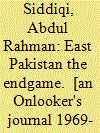

|
|
|
|
|
| Publication |
Karachi, Oxford University Press, 2004.
|
| Description |
xv, 260p.hbk
|
| Standard Number |
0195799933
|
|
|
|
|
|
|
|
|
|
|
|
Copies: C:1/I:0,R:0,Q:0
Circulation
| Accession# | Call# | Current Location | Status | Policy | Location |
| 050080 | 954.9046/SID 050080 | Main | On Shelf | General | |
|
|
|
|
| 18 |
ID:
097998
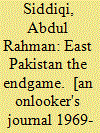

|
|
|
|
|
| Publication |
Oxford, Oxford University Press, 2006.
|
| Description |
xii, 260p.
|
| Standard Number |
9780195799934, hbk
|
|
|
|
|
|
|
|
|
|
|
|
Copies: C:1/I:0,R:0,Q:0
Circulation
| Accession# | Call# | Current Location | Status | Policy | Location |
| 055159 | 954.92/SID 055159 | Main | On Shelf | General | |
|
|
|
|
| 19 |
ID:
118361
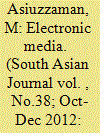

|
|
|
| 20 |
ID:
050695
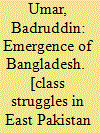

|
|
|
|
|
| Publication |
Oxford, Oxford University Press, 2004.
|
| Description |
xi, 389p.hbk
|
| Standard Number |
0195795717
|
|
|
|
|
|
|
|
|
|
|
|
Copies: C:1/I:0,R:0,Q:0
Circulation
| Accession# | Call# | Current Location | Status | Policy | Location |
| 047666 | 954.92/UMA 047666 | Main | On Shelf | General | |
|
|
|
|
|
|
|
|
|